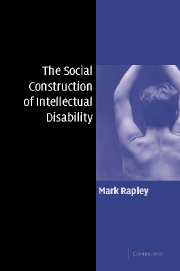Book contents
- Frontmatter
- Contents
- Acknowledgements
- A note on the cover illustration
- A note on transcription notation
- Introduction
- 1 A discursive psychological approach
- 2 Intellectual disability as diagnostic and social category
- 3 The interactional production of ‘dispositional’ characteristics: or why saying ‘yes’ to one's interrogators may be smart strategy
- 4 Matters of identity
- 5 Talk to dogs, infants and …
- 6 A deviant case (written with Alec McHoul)
- 7 Some tentative conclusions
- Appendices
- References
- Index
2 - Intellectual disability as diagnostic and social category
Published online by Cambridge University Press: 20 October 2009
- Frontmatter
- Contents
- Acknowledgements
- A note on the cover illustration
- A note on transcription notation
- Introduction
- 1 A discursive psychological approach
- 2 Intellectual disability as diagnostic and social category
- 3 The interactional production of ‘dispositional’ characteristics: or why saying ‘yes’ to one's interrogators may be smart strategy
- 4 Matters of identity
- 5 Talk to dogs, infants and …
- 6 A deviant case (written with Alec McHoul)
- 7 Some tentative conclusions
- Appendices
- References
- Index
Summary
[U]nder the best conditions only a very small proportion even of the higher grade cases become desirable members of the community. They need protection and care and the family and community should be protected from their certain tendency to drift into pauperism, prostitution and crime.
(Fernald, 1903: np)[T]he definition of a person is to be found in the relationship between the definer and the defined, not determined either by personal characteristics or the abstract meanings attached to the group of which the person is a part.
(Bogdan and Taylor, 1989: 136)Preamble
It is not my intention here to provide a full-scale history of intellectual disability as a psychological concept. There are several such histories which offer either excellent overviews or detailed analyses of specific periods and places: it would serve little purpose to attempt to reproduce that work here. However, as I argued in chapter 1, it is important that the analyses which follow are grounded in an appreciation of not only the recency of the concept of intellectual disability as an attribute of persons, but also of the inextricable linkage between the ascription of the category and explicit, and more recently, implicit evaluations of moral conduct.
- Type
- Chapter
- Information
- The Social Construction of Intellectual Disability , pp. 30 - 77Publisher: Cambridge University PressPrint publication year: 2004



